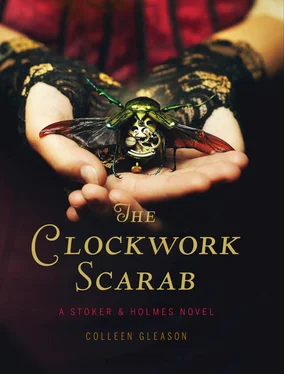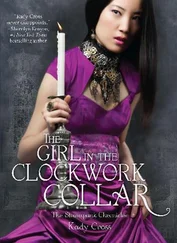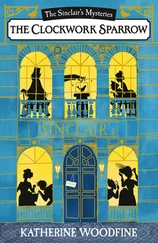“Have you spoken to Miss Holmes?” I couldn’t imagine anything more mind-raking than sitting in this chamber, reading books and organizing them for hours. The bottoms of my feet felt prickly and uncomfortable at the very thought. But Miss Holmes would probably be happy as a pig in slop.
Miss Adler looked at me in surprise. “Of course. She’s been—”
A door on the opposite side of the chamber opened and Miss Mina Holmes strode in. She had her nose in an ancient-looking book. Behind her chugged a small self-propelled cart laden with more volumes. It came to a halt with a little burp of smoke.
“Right, then. Are you moving the entire library into your office?” I asked Miss Adler.
The older woman smiled, and Miss Holmes looked up from her book. “Miss Stoker,” she said. Her voice was cool but not quite rude. “How kind of you to join us.” Now it had gone a little more frosty.
“I would have been here sooner, had you requested my help,” I replied. Glancing at the never-ending piles of books, I thanked Fortune she hadn’t.
“I wasn’t suggesting you offer your assistance,” Miss Holmes replied, her nose back in the book. “I was under the impression this was precisely the sort of endeavor with which you preferred not to be involved.” She glanced up at me with a flash of chilly green-brown eyes. “My experience is that you’re more inclined toward drawing attention to yourself so you can demonstrate your superior fighting skills, regardless of the dangers involved or the prudence of such activity.”
Right. Definitely sulking.
“And, clearly, without any semblance of plan or organization,” she added, thumping the book closed in emphasis.
I bit my lip. So I’d made a mistake. I hadn’t meant to draw attention to myself. I was just . . . doing what I was made to do.
I cast a covert glance at Miss Adler to see her reaction, but the lady seemed engrossed in the book she was reading.
“I would have been here to provide my help with whatever you’re doing. But I received no communication from you.”
Miss Holmes sniffed. “I didn’t realize you required a summons to your duty.”
My spine stiffened. “I—”
“Perhaps,” Miss Adler said without looking up from her page, “you might bring Evaline up to date on our discoveries and theories, Mina.”
Miss Holmes set her book aside and looked up at me. “You might as well take a seat.”
Her cheeks had tinged pink at Miss Adler’s gentle direction. I noticed for the first time that her rich golden-brown hair was in nothing more than a loose knot at the nape of her neck. Dark patches under her eyes made her appear tired, and her dress was rumpled. Had something bad happened? If so, I hadn’t been here to help. I’d been doing my own sulking.
“We’ve been researching Sekhmet’s instruments for the last five days,” Miss Holmes told me as I moved a pile of books to sit on a nearby chair. “I’ve not even left the museum and hardly slept—there are so many references to review. We believe that someone, presumably the Ankh and her Society of Sekhmet, is attempting to follow a legendary formula involving four items that either belonged to the goddess—which is unlikely—or somehow have some supernatural tendencies attributed to her.”
“What sort of instruments?” I asked, thinking of pianos and violins.
“A scepter, a diadem or crown, a cuff or bracelet, and a sistrum, which is a musical instrument.”
Right. Well, I hadn’t been that far off.
I listened with growing interest as she described each of the instruments. They’d found several passages about them in a collection of books and scrolls, and they were even mentioned on a stone with hieroglyphics on it. This sort of puzzle, tinged with supernatural and otherworldly elements, reminded me of the stories from my vampire- and demon-fighting family tree. One of my family members had battled an UnDead who attempted to infuse a large obelisk with evil traits.
“What did the hieroglyphics say?”
My companion gave me a pained look. “Hieroglyphs, not hieroglyphics. The former is the text or the characters, the latter is an adjective. To wit, a hieroglyphic text.”
I glared, and she continued, “The hieroglyphs clearly represented Sekhmet and her instruments, which gives credence to the writings we found in scrolls and papers that simply couldn’t have existed—or at least survived—for the thousands of years since Sekhmet was worshipped as the favored goddess. Thus, we believe the instruments do, or did, exist. But other than that, we haven’t found any further information about where the instruments were, where they might be now, and what they could be used for if collected together—which is the crux of the text that originally sent us off in this direction.” Exhaustion showed in her face. “We could be completely wrong about this, and meanwhile, more girls could die.”
“Wait,” I said, my eyes widening. “A scepter?”
“A scepter, a diadem, a—”
“Some men were taking a large, heavy crate from the museum on the night Miss Hodgeworth was killed, and one of them also had a long, slender object.”
“A large crate? Large enough for the statue of Sekhmet to fit in? Who was it?”
“How the blooming fish should I know? Someone who didn’t want to be seen. Or someone involved with the Society of Sekhmet.”
Did that mean Pix was involved? If so, why would he tell me about it? Was it possible he was aware of the Society of Sekhmet too?
“I don’t know anything more, but I can try to find out while you continue to research more information.” I didn’t try to hide my delight. At least I could be doing something instead of poring over page after page of cramped, faded, archaic writing.
“Did you see the thieves? Do you remember anything—”
“No, I didn’t see them. He said they went off southwise, though,” I added to myself.
“He? Whom do you mean?”
“Some con artist who goes by the name of Pix. I found him lurking around the outside of the museum after you left that night, and he told me.” I stood with enthusiasm. “I’ll track down Pix and get as much information as I can.”
I was nearly to the door when Miss Holmes spoke again. “There is one other situation of which you might like to be apprised, Miss Stoker. If you can bear to be detained long enough for me to do so.”
“Carry on.” The sooner I was out of the room and on the streets, the better.
“Mr. Dylan Eckhert is the young foreigner we found with Miss Hodgeworth’s body,” she said. “He’s been staying here at the museum because he has an unusual problem.”
“Why? Is he partial to hieroglyphs?” I couldn’t help but ask. Miss Adler’s lips twitched, but she remained silent.
“No,” Miss Holmes said in a cool, affronted voice. “He’s traveled more than a hundred years through time, back from the future.”
Right. I blinked. And let the concept settle.
The rest of London would never believe it of their staid, gear-ridden, mechanized world. Vampires. Demons. Supernatural instruments supposedly belonging to an Egyptian goddess . . . and now time travel?
Fascinating and intriguing.
Because of this, Miss Holmes probably expected more from me than a nod of comprehension. But being a vampire hunter, I wasn’t easily surprised by supernatural things. I simply asked, “Does he know how it happened?”
“He isn’t precisely certain, but he believes it had something to do with a man-size statue of Sekhmet. He was near it, and there was an illuminated scarab in its base. When he touched it, something happened and he was transported back in time. When Mr. Eckhert became aware of his surroundings, he realized the statue was gone and he was in a different place and time. I have no theories as yet what caused such an event, but I continue to consider a variety of possibilities. In the meantime, Mr. Eckhert has been assisting us with our research. However, he prefers to spend an inordinate amount of time in the empty chamber belowstairs where he arrived so suddenly. I believe he’s hoping something will happen to reconnect him with his world.”
Читать дальше










